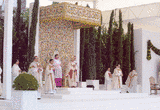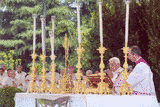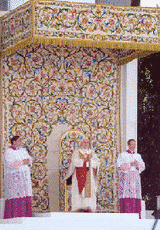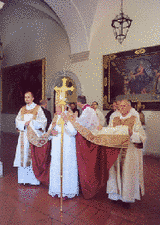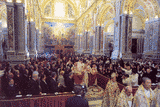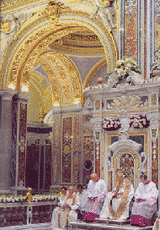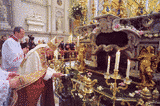Solemnity of the Ascension of Our Lord 2009
Pope Benedict XVI was a pilgrim to Cassino & Monte Cassino.
Benedict XVI's Homily at Mass in Piazza Miranda
Sunday 24 May 2009 - in English, French, German, Italian, Portuguese & Spanish
"Dear Brothers and Sisters,
"You shall receive power when the Holy Spirit has come upon you; and you shall be my witnesses in Jerusalem and in all Judea and Samaria and to the end of the earth" (Acts 1: 8). With these words, Jesus took his leave of the Apostles, as we heard in the First Reading. Immediately afterwards the sacred author adds that "as they were looking on, he was lifted up, and a cloud took him out of their sight" (Acts 1: 9). This is the mystery of the Ascension that we are celebrating today. But what do the Bible and the Liturgy wish to tell us by saying that Jesus "was lifted up"? We cannot understand the meaning of these words from a single text or from a single book of the New Testament but rather by listening attentively to the whole of Sacred Scripture. In fact the verb "to lift up" was originally used in the Old Testament and refers to royal enthronement. Thus Christ's Ascension means in the first place the enthronement of the Crucified and Risen Son of Man, the manifestation of God's kingship over the world.
However, there is an even deeper meaning that is not immediately perceptible. In the passage from the Acts of the Apostles it is said first that Jesus was "lifted up" (v 9) and then it says "taken up" (v 11). The event is not described as a journey to on high but rather as an action of the power of God who introduces Jesus into the space of closeness to the Divine. The presence of the cloud that "took him out of their sight" (v 9), recalls a very ancient image of Old Testament theology and integrates the account of the Ascension into the history of God with Israel, from the cloud of Sinai and above the tent of the Covenant in the desert, to the luminous cloud on the mountain of the Transfiguration. To present the Lord wrapped in clouds calls to mind once and for all the same mystery expressed in the symbolism of the phrase, "seated at the right hand of God". In Christ ascended into Heaven, the human being has entered into intimacy with God in a new and unheard-of way; man henceforth finds room in God for ever. 'Heaven': this word Heaven does not indicate a place above the stars but something far more daring and sublime: it indicates Christ himself, the divine Person who welcomes humanity fully and for ever, the One in whom God and man are inseparably united for ever. Man's being in God, this is Heaven. And we draw close to Heaven, indeed, we enter Heaven to the extent that we draw close to Jesus and enter into communion with him. For this reason today's Solemnity of the Ascension invites us to be in profound communion with the dead and Risen Jesus, invisibly present in the life of each one of us.
In this perspective we understand why the Evangelist Luke says that after the Ascension the disciples returned to Jerusalem "with great joy" (24: 52). Their joy stems from the fact that what had happened was not really a separation, the Lord's permanent absence: on the contrary, they were then certain that the Crucified-Risen One was alive and that in Him God's gates, the gates of eternal life, had been opened to humanity for ever. In other words, his Ascension did not imply a temporary absence from the world but rather inaugurated the new, definitive and insuppressible form of his presence by virtue of his participation in the royal power of God. It was to be up to them, the disciples emboldened by the power of the Holy Spirit, to make his presence visible by their witness, preaching and missionary zeal. The Solemnity of the Lord's Ascension must also fill us with serenity and enthusiasm, just as it did the Apostles who set out again from the Mount of Olives "with great joy". Like them, we too, accepting the invitation of the "two men in dazzling apparel", must not stay gazing up at the sky but, under the guidance of the Holy Spirit, must go everywhere and proclaim the saving message of Christ's death and Resurrection. His very words, with which the Gospel according to St Matthew ends, accompany and comfort us: "and lo, I am with you always, to the close of the age" (Mt 28: 19).
Dear brothers and sisters, the historical character of the mystery of Christ's Resurrection and Ascension helps us to recognize and understand the transcendent condition of the Church which was not born and does not live to compensate for the absence of her Lord who has "disappeared" but on the contrary finds the reason for her existence and mission in the invisible presence of Jesus, a presence working through the power of his Spirit. In other words, we might say that the Church does not carry out the role of preparing for the return of an "absent" Jesus, but, on the contrary, lives and works to proclaim his "glorious presence" in a historical and existential way. Since the day of the Ascension, every Christian community has advanced on its earthly pilgrimage toward the fulfilment of the messianic promises, fed by the word of God and nourished by the Body and Blood of her Lord. This is the condition of the Church, the Second Vatican Council recalls, as she ""presses forward amid the persecutions of the world and the consolations of God', announcing the Cross and death of the Lord until he comes" (Lumen Gentium, 8).
Brothers and sisters of this beloved diocesan community, today's Solemnity urges us to consolidate our faith in the Real Presence of Jesus in history: without him we can do nothing effective in our life or our apostolate. It is he, as the Apostle Paul recalls in the Second Reading, whose "gifts were that some should be apostles, some prophets, some evangelists, some pastors and teachers, for the equipment of the saints, for the work of ministry, for building up the Body of Christ", that is, the Church. And this is in order that we "attain to the unity of the faith and of the knowledge of the Son of God" (Eph 4: 11-13), since the common vocation of one and all is to form "one body and one spirit, just as you were called to the one hope that belongs to your call" (Eph 4: 41). My visit today fits into this perspective. As your pastor noted, its purpose is to encourage you "to build, found and rebuild" your diocesan community ceaselessly on Christ. How? St Benedict himself points out the way to us in his Rule when he recommends that we prefer nothing to Christ: "Christo nihil omnino praeponere" (LXII, 11).
I therefore thank God for the good that your community is doing.. I greet the catechists, the pastoral workers, the young people and all those who in various ways see to spreading the Gospel in this region, laden with history, which experienced periods of great suffering during the Second World War. Silent witnesses of it are the numerous cemeteries that surround your rebuilt town: among them I remember in particular those of Poland, Germany and the Commonwealth. I extend my greeting, lastly, to all the inhabitants of Cassino and of the neighbouring towns: I reach out to each one, and especially to the sick and the suffering, with the assurance of my affection and my prayers.
Dear brothers and sisters, at this celebration we hear resonating St Benedict's appeal to keep our hearts fixed on Christ, to prefer nothing to him. This does not distract us, on the contrary it is an even greater incentive to build a society in which solidarity may be expressed by concrete signs. But how? Benedictine spirituality, well known to you, proposes an evangelical programme that is summed up in the motto: ora et labora et lege - prayer, work and culture. First of all is prayer which is the most beautiful legacy that St Benedict bequeathed to the monks, but also to your particular Church: to your clergy, the majority of whom were trained at the diocesan seminary, for centuries housed in this same Abbey of Monte Cassino, to the seminarians, to the many people educated at the Benedictine schools and "recreation" centres and in your parishes, to all of you who live in this region. In lifting your gaze from every village and part of the diocese you can admire the Monastery of Monte Cassino, that constant reminder of Heaven, to which you climb every year in procession on the eve of Pentecost. Prayer, to which with its sonorous tolling the bell of St Benedict summons the monks every morning, is the silent path that leads us straight to God's Heart; it is the breath of the soul that restores peace to us in the storm of life. Furthermore, at the school of St Benedict, the monks have always cultivated a special love for the word of God in lectio divina, which today has become the common patrimony of many. I know that your diocesan Church, in adopting the guidelines of the Italian Bishops' Conference, takes great pains to acquire a deeper knowledge of the Bible and indeed has inaugurated a programme for the study of the Sacred Scriptures, this year dedicated to the Evangelist Mark, which will continue over the next 4 years and conclude, please God, with a diocesan pilgrimage to the Holy Land. May attentive listening to the divine word nourish your prayers and make you prophets of truth and love in a unanimous commitment to evangelization and human advancement.
Another pivot of Benedictine spirituality is work. Humanizing the working world is characteristic of the soul of monasticism and this is also an endeavour of your community that seeks to be beside the numerous workers in the large industry present at Cassino and in the businesses connected with it. I know how critical the situation of many of the workers is. I express my solidarity to all those who are living in a worrying and precarious plight, to workers on redundancy pay or who have actually been discharged. May the wound of unemployment that afflicts this territory induce the public authorities, entrepreneurs and all who have means to seek, with the help of all, effective solutions to the employment crisis, creating employment in order to safeguard families. In this regard how can we forget that the family urgently needs better protection because this institution is dangerously threatened at its very roots? Then I am thinking of the young people who have difficulty in finding dignified work that will enable them to build a family. I would like to say to them: do not feel discouraged, dear friends, the Church does not abandon you! I know that at least 25 young people of your diocese took part in the last World Youth Day in Sydney. In treasuring that extraordinary spiritual experience, may you be Gospel leaven among your friends and peers; with the power of the Holy Spirit, be new missionaries in this land of St Benedict!
Lastly, attention to the world of culture and education is part of your tradition. The famous archives and library of Monte Cassino contain innumerable testimonies of the commitment of men and women who meditated upon and sought ways to improve the spiritual and material life of human beings. In your Abbey the "quaerere Deum" is tangible, that is, it is possible to feel that European culture has consisted in the search for God and the readiness to listen to him and this also applies in our day. I know that you work with this same spirit in universities and schools so that they may become workshops of knowledge, research and enthusiasm for the future of the generations to come. I also know that in preparation for this visit, you recently held a congress on the theme of education, to inspire in everyone a keen determination to pass on to the young the indispensable values of our human and Christian heritage. In today's cultural effort which aspires to creating a new humanism, faithful to the Benedictine tradition, you rightly intend also to pay attention to the frail and the weak, to the disabled and to immigrants. and I am grateful to you that you are giving me the opportunity to inaugurate on this very day the "House of Charity" at which a culture attentive to life is being built with deeds.
Dear brothers and sisters, it is not hard to see that your community, this portion of the Church which lives round Monte Cassino, is the heir and depositary of the mission steeped in St Benedict's spirit to proclaim that in our life no one and nothing must take priority over Jesus; the mission to construct, in Christ's name, a new humanity under the banner of acceptance and assistance to the weakest. May your holy Patriarch help you and accompany you together with St Scholastica, his sister; and may the holy Patrons and especially Mary, Mother of the Church and Star of our Hope, protect you. Amen!"
Papa Benedetto's words at the Regina Cæli in Piazza Miranda, Cassino
Sunday 24 May 2009 - in Croatian, English, French, Italian, Portuguese & Spanish
"Dear Brothers and Sisters, Every time we celebrate Holy Mass we feel echoing in our hearts the words that Jesus entrusted to the disciples at the Last Supper as a precious gift: "Peace I leave with you; my peace I give to you" (Jn 14: 27). How great is the need of the Christian community and the whole of humanity to taste to the full the riches and power of Christ's peace! St Benedict was a great witness of it because he welcomed it into his life and made it fruitful in works of authentic cultural and spiritual renewal. For this very reason, the word PAX is displayed as a motto at the entrance to the Abbey of Monte Cassino and to every other Benedictine monastery: in fact, the monastic community is called to live in accordance with this peace, which is a Paschal gift par excellence. As you know, I went on my recent journey to the Holy Land as a pilgrim of peace and today in this region marked by the Benedictine charism I am granted the opportunity to emphasize, once again, that peace is in the first place a gift of God, hence its strength is found in prayer.
However, it is a gift entrusted to human commitment. The necessary energy to put it into practice can also be drawn from prayer. It is therefore fundamental to cultivate an authentic life of prayer to assure the social progress of peace. Once again the history of monasticism teaches us that a great development of civilization is prepared for by listening daily to the Word of God, which impels believers to make a personal and community effort to fight every form of selfishness and injustice. Only by learning, with Christ's grace, to combat and defeat the evil within ourselves and in relations with others, do we become authentic builders of peace and of civil progress. May the Virgin Mary, Queen of Peace, help all Christians in their different vocations and walks of life to be witnesses of the peace that Christ gave us and left to us as a demanding mission to be carried out everywhere.
Today, 24 May, on the liturgical Memorial of the Blessed Virgin Mary, Help of Christians - venerated with deep devotion in the Shrine of Sheshan in Shanghai - the Day of Prayer for the Church in China is being celebrated. My thoughts turn to the whole Chinese population. I greet Catholics in China in particular with great affection and I urge them to renew on this day their communion of faith in Christ and of fidelity to the Successor of Peter. May our prayer in common obtain an outpouring of the gifts of the Holy Spirit, so that unity among all Christians and the catholicity and universality of the Church will be ever deeper and more visible."
* * * After the Regina Caeli:
"Je suis heureux de saluer les pèlerins de langue française qui ont voulu participer à cette célébration ou qui nous sont unis par la radio ou par la télévision. Mon pèlerinage en ces lieux marqués par le souvenir de saint Benoît est l’occasion de l’invoquer aux intentions de l’Europe tout entière, dont il est aussi l’un des Patrons. Que son témoignage spirituel aide les peuples qui vivent sur ce continent à demeurer fidèles à leurs racines chrétiennes, et à édifier une Europe unie et solidaire, fondée sur la recherche de la justice et de la paix. Que Dieu vous bénisse!
I greet the English-speaking pilgrims who have come here today to Monte Cassino. From the heights of this mountain we contemplate with joy our risen and ascended Lord, who has taken his seat in heaven at the right hand of the Father. Where he has gone, we hope to follow. In this place, where so many lost their lives in the battles that were fought during the Second World War, we pray especially for the souls of the fallen, commending them to God’s infinite mercy, and we pray for an end to the wars that continue to afflict our world. May God pour out his blessings upon all of you and upon your loved ones at home.
Einen herzlichen Gruß richte ich an die deutschsprachigen Gäste hier in Cassino wie auch an alle, die über Rundfunk und Fernsehen mit uns verbunden sind. Gerne nehme ich eure Anliegen mit auf den Berg, wenn ich dort am Grab des heiligen Benedikt, des Patrons Europas, für den Frieden auf diesem Kontinent und in der Welt bete. Ebenso gedenke ich aller Gefallenen des Zweiten Weltkriegs, wenn ich am Abend stellvertretend den nahegelegenen polnischen Soldatenfriedhof besuche. Es fügt sich, daß genau heute sich zum hundertsten Mal der Todestag von Abt Franz Pfanner aus Vorarlberg jährt, dem Gründer der Kongregation der Missionare von Mariannhill. Nehmen wir ein Wort dieses Mönchs und Missionars mit in die neue Woche hinein: „Laß das Licht der Freude und des Frohsinns brennen und behüte es in deiner Seele“. Ja, lassen wir dieses Licht Christi in uns nicht ausgehen! Der Herr geleite euch auf allen Wegen.
Queridos hermanos y hermanas, en esta solemnidad de la Ascensión del Señor, que hoy se celebra en muchos lugares, os invito a pedir constantemente por la Iglesia, para que, exultante de gozo por la resurrección de Cristo y con la fuerza del Espíritu Santo, continúe anunciando con fidelidad el Evangelio de la salvación y dando testimonio de la caridad con la palabra y las obras. Feliz domingo.
Serdeczne pozdrowienie kieruję do Polaków. Po południu udam się na polski cmentarz, aby uczcić pamięć wszystkich żołnierzy różnych narodowości, którzy dali świadectwo odwagi i tu ponieśli śmierć. Za wstawiennictwem św. Benedykta prośmy Boga, abyśmy dzięki modlitwie i pracy odkrywali nowe przestrzenie wolności, i by trwał pokój w Europie i na całym świecie. Niech Bóg wam błogosławi!
E infine saluto con grande affetto voi tutti, abitanti di Cassino e del suo territorio! Vi ringrazio per la vostra accoglienza, in particolare quanti avete in diversi modi collaborato alla preparazione della mia visita. La Madonna vegli sempre su di voi e vi dia la forza di perseverare nel bene. Un pensiero speciale rivolgo anche ai ragazzi della Diocesi di Genova, radunati in questo momento a Roma, in Piazza San Pietro, per festeggiare la loro Cresima. In questa domenica, in cui si celebra la Giornata delle comunicazioni sociali, con fiducia filiale invochiamo Maria Ausiliatrice con la preghiera del Regina caeli. Grazie di cuore!"
BXVI's Homily for 2nd Vespers of the Ascension
at the Benedictine Archabbey on Monte Cassino
Sunday 24 May 2009 - in English, French, German, Italian, Portuguese & Spanish
"Dear Brothers and Sisters of the great Benedictine Family,
At the conclusion of my visit today, I am particularly glad to pause in this sacred place, in this Abbey, 4 times destroyed and rebuilt for the last time after the bombing of the Second World War 65 years ago. "Succisa virescit": the words of the new coat of arms clearly convey its history. Monte Cassino, like the age-old oak planted by St Benedict, "stripped of its leaves" by the violence of the war, sprang up even more vigorously than before. More than once I have been able to enjoy the hospitality of the monks and have spent unforgettable moments of stillness and prayer in this Abbey. This evening we entered singing the Laudes regiae in order to celebrate Vespers together on the Solemnity of the Ascension of Jesus. I express to each one of you the joy of sharing this moment of prayer, as I greet you all with affection, grateful to you for your welcome and to all who have accompanied me on this apostolic pilgrimage. I greet in particular Dom Pietro Vittorelli, the Abbot, who has expressed your common sentiments. I extend my greeting to the Abbots, the Abbesses and the Benedictine communities who are present here.
Today the liturgy invites us to contemplate the mystery of the Lord's Ascension. In the short Reading from the First Letter of Peter, we were urged to fix our gaze on our Redeemer who died "for sins once for all", that he might bring us back to God; he "has gone into Heaven" and is at the right hand of God "with angels, authorities, and powers subject to him" (cf 1 Pt 3: 18, 22). "Carried up into Heaven" and made invisible to the eyes of his disciples, Jesus nevertheless did not abandon them. Indeed, "put to death in the flesh but made alive in the spirit (1 Pt 3: 18), he is now present in a new way, within believers, and in him salvation is offered to every human being independently of his race, language or culture. The First Letter of Peter contains precise references to fundamental Christological events of the Christian faith. The Apostle is concerned to shed light on the universal significance of salvation in Christ. We find a similar incentive in St Paul, the 2000th anniversary of whose birth we are celebrating and who wrote to the community at Corinth: "He (Christ) died for all, that those who live might live no longer for themselves but for him who for their sake died and was raised" (2 Cor 5: 15).
To live no longer for ourselves but for Christ: this is what gives full meaning to the life of those who let themselves be conquered by him. This is clearly demonstrated by the human and spiritual life of St Benedict who, having abandoned all things, set out to follow Jesus Christ faithfully. Embodying the Gospel in his life, he became the pioneer of a vast movement of spiritual and cultural rebirth in the West. I would like here to mention an extraordinary event in his life related by St Gregory the Great, his biographer, and which is certainly well known to you. One might almost say that the holy Patriarch was also "carried up into Heaven" in an indescribable mystic experience. On the night of 29 October 540, we read in the biography, while leaning out of the window, "his eyes fixed on the stars and wrapt in divine contemplation, the Saint felt that his heart was burning... for him the starry firmament was like the embroidered curtain that veiled the Holy of Holies. At a certain point, his soul felt transported to the other side of the veil, to contemplate unveiled the Face of the One who dwells in inaccessible brightness." Of course, similarly to what happened for Paul after he had been taken up into Heaven, for St Benedict too subsequent to this extraordinary spiritual experience, a new life had to begin. Indeed, although the vision was but fleeting the effects endured, his features themselves, the biographers say, were altered by it, his expression always remained serene and his behaviour angelic and although he lived on earth it was obvious that his heart was already in Paradise.
St Benedict did not of course receive this divine gift to satisfy his intellectual curiosity, but rather so that the charism with which God had endowed him might enable him to reproduce in the monastery the very life of Heaven and to re-establish the harmony of creation through contemplation and work. Rightly, therefore, the Church venerates him as an "eminent teacher of monastic life" and a "doctor of spiritual wisdom in his love of prayer and work"; a luminous "guide of the peoples to the light of the Gospel" who, "lifted up to Heaven on a shining path", teaches men of all times to seek God and the eternal riches prepared by him.
Yes, Benedict was a shining example of holiness and pointed Christ out to the monks as the one great ideal; he was a teacher of civilization who, in suggesting a balanced and adequate vision of the divine requirements and ultimate destiny of the human being, always also kept clearly in mind the needs and reasons of the heart, to teach and inspire authentic and constant brotherhood so that, in the complex social relations, people would not lose sight of a spiritual unity that would always be capable of building and fostering peace. It is not by chance that the word PAX is used to greet pilgrims and visitors at the entrance of this Abbey, rebuilt after the dreadful disaster of the Second World War; it rises like a silent warning to reject every form of violence in order to build peace: in families, in communities, among peoples and throughout humanity. St Benedict invites every person who climbs this hill to seek peace and to follow him: "inquire pacem et sequere eam (Ps 33: 14-15)" (Rule, Prologue, 17).
At his school monasteries down the centuries became fervent centres of dialogue, encounter and a beneficial blending of different peoples, unified by the evangelical culture of peace. Monks have been able to teach the art of peace by word and example, putting into practice the three "bonds" that Benedict mentions as necessary to preserve the unity of the Spirit among human beings: the Cross, that is the very law of Christ; the book, or in other words culture; and the plough that implies work, the domination of matter and of time. Thanks to the activity of monasteries that is structured in accordance with the threefold daily commitment of prayer, study and work, entire peoples on the European continent have experienced authentic redemption and a beneficial moral, spiritual and cultural development, learning the meaning of continuity with the past, practical action for the common good, openness to God and the transcendent dimension. Let us pray that Europe may always be able to make the most of this patrimony of Christian principles and ideals that constitutes an immense cultural and spiritual wealth.
This is possible but only if one accepts the constant teaching of St Benedict, that is the "quaerere Deum", the quest for God, as man's fundamental commitment. Human beings cannot completely fulfil themselves, they cannot be truly happy without God. It is your task in particular, dear monks, to be living examples of this inner and profound relationship with him, implementing without compromise the programme that your Founder summed up in the "nihil amori Christi praeponere", "prefer nothing to the love of Christ" (Rule 4: 21). Holiness consists of this, a valid proposal for every Christian, especially in our time, in which people feel the need to anchor life and history to sound spiritual references. For this reason, dear brothers and sisters, your vocation is more up to date than ever and your mission as monastics is indispensable.
From this place, where his mortal remains rest, the holy Patron of Europe continues to invite everyone to pursue his work of evangelization and human promotion. In the first place he encourages you, dear monks, to stay faithful to the spirit of your origins and to be authentic interpreters of his programme of spiritual and social rebirth. May the Lord grant you this gift through the intercession of your Holy Founder, of St Scholastica, his sister, and of the Order's Saints. And may the heavenly Mother of the Lord, whom we invoke today as "Help of Christians," watch over you and protect this Abbey and all your monasteries as well as the diocesan community that has grown up around Monte Cassino. Amen!"
© Copyright 2009 - Libreria Editrice Vaticana

